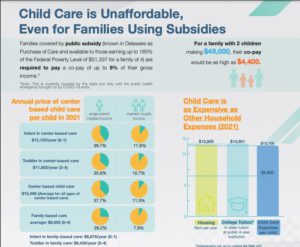Want Economic Growth? Start by Investing in Child Care
Politicians often tout healthy signs of the economy: people getting jobs, buying homes, and going back to school. But in a recent Delaware survey, 4 out of 5 families lack…

Politicians often tout healthy signs of the economy: people getting jobs, buying homes, and going back to school. But in a recent Delaware survey, 4 out of 5 families lack access to affordable child care, which hinders them from doing all these things. Almost half of families who responded said that child care is their biggest monthly expense, and more than one-third said child care costs more than their mortgage. If policymakers in Delaware and other states want to make good on their promises for a healthy economy, increasing access to high-quality child care is key. Most importantly, increasing access to high-quality child care will help children and families thrive. Politicians like those in the new Congressional Dads Caucus know that policymakers have the power to minimize the many barriers that families face. Families in Delaware cited the following challenges, which reflect those of families across the country:
Child care for infants in large counties costs up to 19.3% of family income. In 34 states, center-based infant child care costs more than in-state public college tuition. Although child care subsidies exist for some parents, especially those who are students, far too few subsidies are truly accessible, and federal and state policymakers should make it easier for families to access them.

Parents who work non-traditional hours have an especially tough time finding child care, and when they do access it, it is even more expensive than typical child care programs. State and local governments and state and local chambers of commerce should work together to incentivize the creation or expansion of child care programs that are open outside the typical 9-to-5 workday. Student parents also have atypical schedules and should have access to affordable child care during class hours.
More than a third of the surveyed families were on a waitlist for two or more child care centers that they contacted, many of which had months-long waits. There are not enough spots in child care largely because there are too few child care providers. To recruit and retain early childhood educators, federal and state policymakers and institutes of higher education should ensure that the path to becoming an early childhood educator is equitable, accessible, and affordable. State leaders should take innovative approaches to increase wages and benefits for early childhood educators to match those of elementary school teachers with similar qualifications. Policymakers should make sure to get input from early childhood educators early in the decision-making processes through virtual hearings, briefings, and advisory councils that include stipends and technological and transportation support. Providers also face a variety of barriers to accessing professional development opportunities. Policymakers should work to create new opportunities for child care workers to build skills and capacity and provide grants for child care programs to start up, expand, hire, and increase quality so they have capacity to take the steps needed to serve linguistically diverse families and provide for children with disabilities.
Many families of children with disabilities cannot find early learning programs that support their students’ needs, and children of color are underrepresented in early intervention and preschool special education programs. Inclusive early learning programs are especially beneficial to children with disabilities as opposed to segregated settings, but there are large disparities on who has access to these inclusive learning programs. Federal, state, and local policymakers can increase funding and accessibility of high-quality, early childhood education programs that are inclusive.
Multilingual young learners get their strongest start in high-quality bilingual early learning programs. Yet there are not nearly enough of these programs, and where they do exist, English learners are underrepresented. Access to high-quality learning experiences in a child’s home language in addition to English strengthens children’s literacy and improves academic outcomes. Federal, state, and local policymakers should increase funding, guidance, and professional development to increase accessibility to high-quality bilingual early learning programs and teachers
Delaware’s governor provides a good example of a responsive government official who is instituting big child care investments and initiatives. If policymakers are serious about supporting children, families, and the economy, child care is the place to start.